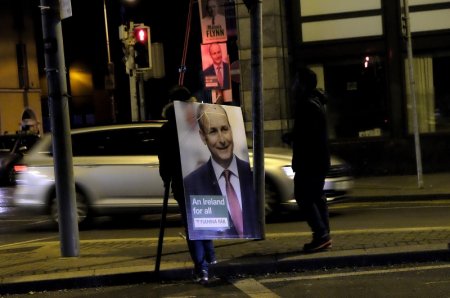-
Tips for becoming a good boxer - November 6, 2020
-
7 expert tips for making your hens night a memorable one - November 6, 2020
-
5 reasons to host your Christmas party on a cruise boat - November 6, 2020
-
What to do when you’re charged with a crime - November 6, 2020
-
Should you get one or multiple dogs? Here’s all you need to know - November 3, 2020
-
A Guide: How to Build Your Very Own Magic Mirror - February 14, 2019
-
Our Top Inspirational Baseball Stars - November 24, 2018
-
Five Tech Tools That Will Help You Turn Your Blog into a Business - November 24, 2018
-
How to Indulge on Vacation without Expanding Your Waist - November 9, 2018
-
5 Strategies for Businesses to Appeal to Today’s Increasingly Mobile-Crazed Customers - November 9, 2018
Irish PM under pressure to join hands with rival party
THE 10 Fine Gael Mayo county councillors are due to have a meeting to air their views on the possibility of the party forming a government with Fianna Fáil. Some final results from tightly-fought constituencies will not emerge until at least Monday.
Advertisement
Political leaders are scrambling to find allies to form a new administration after one of the most indecisive general election outcomes of recent times.
First results from Friday’s vote indicated Kenny’s Fine Gael party and its junior partner, Labour, will no longer have a parliamentary majority ― but neither will any other grouping, meaning weeks of negotiations may lie ahead.
The question now is whether they can put their old rivalry behind them to provide a stable government for the eurozone’s fastest growing economy and avoid the instability which has rocked other austerity-hit countries like Spain.
Sinn Fein leader Gerry Adams (R) is held aloft with with Sinn Fein candidate Imelda Munster (L) after being re-elected during the Irish general election in Dundalk, Co Louth, Ireland, on February 28 2016.
The republican Sinn Fein party finished in third place with a somewhat disappointing 13.8 per cent share of the popular vote.
Fianna Fail leader Micheal Martin hinted that he would first try to form a government with other groups, however.
Meanwhile, The Sunday Times calls the election a “mauling” – while adding that Kenny remains “defiant” after Fine Gael’s disappointing election.
Labour won an unprecedented 37 parliamentary seats in 2011.
If Ireland’s two political heavyweights cannot negotiate a pact, Fine Gael or Fianna Fail could seek support from a dizzying array of small parties and independents on target for election as results kept trickling in Saturday night and Sunday across this nation of 4.6 million.
With midnight approaching, Michael Healy-Rae finally was declared Kerry’s first victor.
Dismissing the idea of a long-term deal between Fine Gael and Fianna Fail, Ahern quipped that Ireland likely faced a “kaleidoscope coalition” dependent on independent lawmakers and erratic small parties that would be lucky to survive even a year.
But while it is not clear who all of the winners are, Enda Kenny, the prime minister, knows his party is in danger of losing its grip on power.
Fine Gael and Fianna Fail, which trace their origins to opposite sides of Ireland’s 1922-23 civil war, are the two largest political parties in the country.
“We will not be the facilitators or enablers of Fianna Fail or Fine Gael to run rampant across an unequal society”. But he declined to rule out coalition talks with Kenny.
“I can’t see any Taoiseach going over to see Obama on St Patrick’s Day”, he said, referring to the traditional meeting between Ireland’s prime minister and the USA president in March.
The first official victor of a seat in Ireland’s next parliament, Shane Ross, says he’s open to propping up the next government – so long as it’s interested in drastically changing its economic policies.
“Either we could have another election now and do away with the count, or we’ll let them muddle around for a month or so and maybe they can think the unthinkable”, said Michael Marsh, a professor of politics at Trinity College Dublin.
Advertisement
After his ruling coalition was ousted by voters angry at the country’s uneven recovery, Prime Minister Enda Kenny’s Fine Gael was set to fall about 30 seats short of the 80 needed to form a majority in parliament, with vote counting drawing to a close.





























